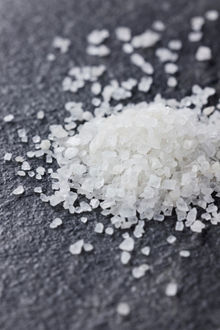Iodine Global Network (IGN)
Sprunglinks/Accesskeys
Zur Startseite (Accesskey 0) Direkt zur Hauptnavigation (Accesskey 1) Direkt zum Inhalt (Accesskey 2) Kontakt (Accesskey 3) Sitemap (Accesskey 4) Suche (Accesskey 5)
DONATE

Ireland urged to implement universal salt iodization

Researchers at University College, Dublin (Ireland) have been asked to carry out an analysis on the levels of iodine in the Irish diet. Responding to a parliamentary question from FG TD Deputy Mary Mitchell O’Connor on the steps he was taking to “address the Irish population’s iodine deficiency” and why Ireland had yet to add iodine to table salt, Minister Leo Varadkar said a 2011 report from the Food Safety Authority of Ireland revealed that the average daily intake of iodine by the Irish population ranged from 170-260mg, which he said was in line with the recommended daily allowance of 130mg for those aged 18-64.
But the Minister also admitted that “a certain proportion may have intakes below this during the summer; the reason for which may lie in the fact that milk and milk products contain less iodine during the summer period”.
While he faithfully represented the FSAI report on the issue, this may be misleading as this report relied on projected food consumption data.
Methods for investigation of iodine deficiency in a population recommended by the WHO rely on measurement of iodine in the urine of population cohorts. Such studies, both in Ireland and the UK, which share the doubtful distinction of being the only EU countries not having ready access to iodised table salt (less than 5 per cent of table salt sold is iodised) have shown that iodine deficiency persists to a significant extent in both female schoolchildren and pregnant mothers, for whom it poses a significant risk.
The foetus in the womb does not develop a thyroid until 13-15 weeks’ gestation and during this time the mother must provide thyroid hormones, for which iodine is a raw material, for both herself and the baby. An inadequate supply of thyroid hormones arising from iodine deficiency can lead to impaired brain development with a diminished IQ. All this can be prevented by ensuring that young women of child-bearing age have access to sufficient dietary iodine.
The most effective way of achieving this is by iodisation of table salt. This so-called Universal Salt Iodisation (USI) is the method of choice of achieving iodine sufficiency in all of our EU partners as well as most other countries. Implementation of a policy of USI, which is not expensive, is urgently needed in Ireland.
The Minister also said that adding iodine to salt was permitted in Ireland and other European countries and that the Department of Health was currently revising the Healthy Eating Guidelines, which would be published later this year. The Department also intends to start work on a National Nutrition policy later in 2015, and iodine intake will form part of this work.
Photo: Julia_Sudnitskaya
But the Minister also admitted that “a certain proportion may have intakes below this during the summer; the reason for which may lie in the fact that milk and milk products contain less iodine during the summer period”.
While he faithfully represented the FSAI report on the issue, this may be misleading as this report relied on projected food consumption data.
Methods for investigation of iodine deficiency in a population recommended by the WHO rely on measurement of iodine in the urine of population cohorts. Such studies, both in Ireland and the UK, which share the doubtful distinction of being the only EU countries not having ready access to iodised table salt (less than 5 per cent of table salt sold is iodised) have shown that iodine deficiency persists to a significant extent in both female schoolchildren and pregnant mothers, for whom it poses a significant risk.
The foetus in the womb does not develop a thyroid until 13-15 weeks’ gestation and during this time the mother must provide thyroid hormones, for which iodine is a raw material, for both herself and the baby. An inadequate supply of thyroid hormones arising from iodine deficiency can lead to impaired brain development with a diminished IQ. All this can be prevented by ensuring that young women of child-bearing age have access to sufficient dietary iodine.
The most effective way of achieving this is by iodisation of table salt. This so-called Universal Salt Iodisation (USI) is the method of choice of achieving iodine sufficiency in all of our EU partners as well as most other countries. Implementation of a policy of USI, which is not expensive, is urgently needed in Ireland.
The Minister also said that adding iodine to salt was permitted in Ireland and other European countries and that the Department of Health was currently revising the Healthy Eating Guidelines, which would be published later this year. The Department also intends to start work on a National Nutrition policy later in 2015, and iodine intake will form part of this work.
Photo: Julia_Sudnitskaya
